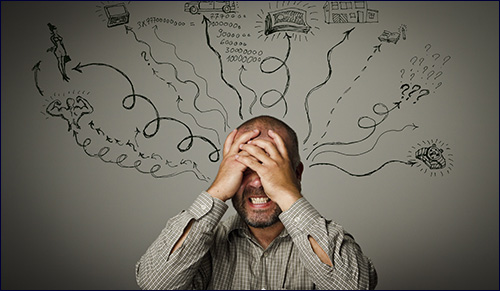 Vampire Weekend's Surprising Jewish Stories
Vampire Weekend's Surprising Jewish Stories


5 min read
There is a world of difference between clinical depression and having a bad day.
When I was a young rabbi and I first encountered someone with depression, I vividly remember thinking to myself, why can’t he just snap out of it? What does he mean when he says he sleeps most of the day and can’t concentrate on anything? We are all tired and dealing with stress. Just resolve to get out of bed and get going. I remember not being able to understand why he was so depressed. After all, by all measures, his life was pretty good. If he were to just focus on the blessings and simply choose to be positive, he wouldn’t be depressed at all.
Looking back, I am incredibly grateful that I didn’t articulate any of these sentiments to him, but nevertheless, I feel ashamed and even guilty for having being so ignorant and insensitive to what depression is all about.
We perpetrate a terrible disservice by using the exact same word to describe how we feel when our favorite team gets knocked out of the playoffs or when our cell phone breaks, and a chemical, clinical illness that can be debilitating and incapacitating. Clinical depression is not about feeling blue, or down in the dumps or terribly sad. It is a serious illness that can be the result of a combination of genetic, biological, environmental, and psychological factors.
Depression is no more the fault of the person suffering with it than cancer or Alzheimer’s are the fault of someone suffering with one of those conditions. Just as the patient with cancer cannot simply will his or her cancer away and the individual with Alzheimer’s cannot simply determine to stop forgetting, the person with depression cannot just decide to not feel anxious, worthless, or exhausted. It is terribly unfortunate and unacceptable that depression remains stigmatized even today. Having a physical illness can be awkward, but should not be a source of embarrassment or guilt. Similarly, having depression, equally out of one’s control, should not be a source of shame or inadequacy.
If you are experiencing the symptoms of depression like decreased appetite, inability to sleep or excessive sleeping, restlessness, fatigue, difficulty concentrating, or thoughts of death, I urge you to seek support. If you recently had a baby and despite the newfound blessing you just can’t get yourself out of your rut, you may be suffering from postpartum depression. You are not the first person to experience this, and you have nothing to be embarrassed or ashamed about. Please don’t hesitate to reach out to a local Rabbi or Rebbetzin who will guide you to the resources and people that can help you without judgment.
Like any illness, depression requires diagnosis, intervention, and treatment. Like all illnesses it also requires the love, patience, understanding, and support of family and friends. However, for the most part, while people extend themselves remarkably to cook meals, shop for groceries, babysit children, or even just send a thoughtful text to check in on someone recovering from cancer or another physical condition, the person with depression or another mental health diseases often feels isolated, alone, neglected, and ignored.
May is Mental Health Awareness Month, a perfect time to educate ourselves. As we resolve to be more sensitive, please consider the following:
Don’t use the term “depressed” unless it is clinically appropriate. Find another way to say you are sad, bummed out, disappointed or feeling blue. Saying you are depressed over a relatively minor issue minimizes the suffering of someone struggling with true depression.
When someone you know is acting differently or unusual, don’t judge them or jump to assumptions about them. Ethics of the Fathers (2:4) quotes Hillel who said: “Do not judge another until you have stood in his place.” Since it is impossible to stand in another person’s place, to be them, to have their baggage or to live their struggles, we can never judge another. Instead, we should be kind, sensitive, supportive and understanding of everyone around us.
Never assume you know everything going on in someone’s life or what motivates his or her behavior. Ian Maclaren, the 19th-century Scottish author once said, “Be kind, for everyone you meet is fighting a battle you know nothing about.” Cut others slack; give people the benefit of the doubt.
When you know a friend or family member has depression or other mental illness such as bi-polar, anxiety disorder, etc., be as supportive as you would be with someone suffering with a physical illness or disability. Offer help and assistance, check in, and let them know you are just thinking of them. Unlike acute illnesses, most of the time, depression is chronic. Once diagnosed, it can be controlled, lessened, or perhaps, even go into “remission.” But it is never cured. Support will be needed in some form always.
When reaching out to someone with depression, never judge, criticize or make comparisons. Don’t offer advice or minimize the person’s suffering. Simply listen, be present, and be a friend.
When someone has depression it places a tremendous burden on other members of the family who often need to take over chores, responsibilities and even produce greater income. Go out of your way to be inclusive of them, to check in on them and seek to unburden them.
